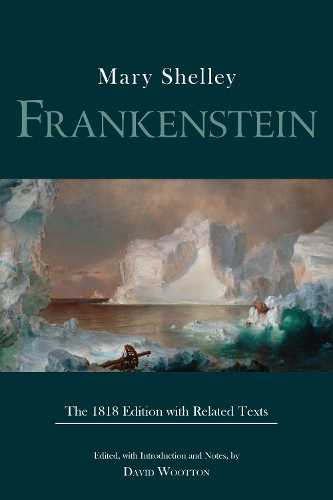
Frankenstein: The 1818 Edition with Related Texts
(Paperback)
Available Formats
Hardback, New edition
Published: 4th March 2025
Hardback
Published: 29th July 2025
Hardback
Published: 24th April 1992
Paperback, Illustrated edition
Published: 1st March 2020
Hardback
Published: 25th March 2025
Paperback
Published: 23rd September 2013
Paperback
Published: 30th July 2018
Hardback
Published: 17th November 2020
Hardback, Illustrated edition
Published: 1st November 2020
Hardback
Published: 31st May 2018
Paperback
Published: 15th May 2005
Hardback
Published: 20th November 2013
Hardback
Published: 15th February 2022
Paperback, Enriched Classic
Published: 15th May 2007
Hardback
Published: 3rd November 2020
Hardback
Published: 23rd October 2013
Paperback
Published: 4th May 2012
Paperback
Published: 3rd July 2014
Hardback
Published: 14th February 2017
Paperback
Published: 16th November 2018
Publishing Details
Frankenstein: The 1818 Edition with Related Texts
By (Author) Mary Shelley
Edited by David Wootton
Hackett Publishing Co, Inc
Hackett Publishing Co, Inc
23rd November 2020
United States
Classifications
General
Fiction
Horror, ghost stories and supernatural fiction
823.7
Physical Properties
Paperback
384
Width 153mm, Height 229mm
513g
Description
'In this new edition of Mary Shelley's Frankenstein, David Wootton's Introduction gives the reader both a clear and gripping account of the biographical circumstances that led to the novel's writing and the most striking and original interpretations of its central themes and of the intellectual and cultural influences on them. Offering a new account of the complex history of its composition, and drawing upon his deep knowledge of eighteenth- and nineteenth-century scientific debates, Wootton reveals the ways in which the origins of Shelley's novel are inextricably linked to conceptions of the origins of life itself. We have here a transformative reading of one of the world's best-known stories.' Laura Marcus, Goldsmiths' Professor of English Literature and Fellow of New College, University of Oxford
'A superb edition of Shelley's troubling masterpiece, with lucid explanatory notes and rich contextual material on the biographical, cultural, and scientific background to the text. Wootton's Introduction is a tour de force of revisionist scholarship, and his bold new arguments about Frankenstein's reworking of Promethean myth, its engagement with Romantic-era science, and the sources and significance of its arctic frame-tale will set the agenda for future debate.' Thomas Keymer, Chancellor Henry N. R. Jackman University Professor of English, University of Toronto
Reviews
"A superb edition of Shelley's troubling masterpiece, with lucid explanatory notes and rich contextual material on the biographical, cultural, and scientific background to the text. Wootton's Introduction is a tour de force of revisionist scholarship, and his bold new arguments about Frankenstein 's reworking of Promethean myth, its engagement with Romantic-era science, and the sources and significance of its arctic frame-tale will set the agenda for future debate." -- Thomas Keymer, Chancellor Henry N. R. Jackman University Professor of English, University of Toronto
"Wootton's new edition presents Shelley's Frankenstein in a vivid new light. Informed by his immense erudition in the histories of both science and political thought, his brilliantly lucid Introduction pieces together the book's complex and sometimes conflicting elements, and proposes several new interpretations. Generously annotated throughout, and with a judicious selection of related writings and contemporary reviews, this will be the go-to text for all students of the novel." -- Seamus Perry, Professor of English Literature and Fellow of Balliol College, University of Oxford
"David Wootton, the editor of a splendid new edition of Frankenstein that includes a rich variety of relevant texts, prefers to focus on the contribution made to the novel by Mary's reading of contemporary articles on travel (the book's first narrator, Robert Walton, is bound for the North Pole, which he describes as 'the favourite dream of my early years'). Wootton's magisterial introduction grants equal significance to the earnest discussions about generating life that took place in 1816 at Lord Byron's lakeside villa in Switzerland, where Frankenstein was conceived." Miranda Seymour, in The New York Review of Books
Author Bio
Frankenstein by Mary Shelley is a novel written in epistolary form, documenting a fictional correspondence between Captain Robert Walton and his siste, Margaret Walton Saville. Walton is failed writer and captain who sets out to explore the North Ple and expand his scientific kowledge in hopes of achieving fame. Durng the voyage, the cre spots a dog saled driven by a gigantic fiture. David Wootton is Anniversary Professor of History, University of York.
